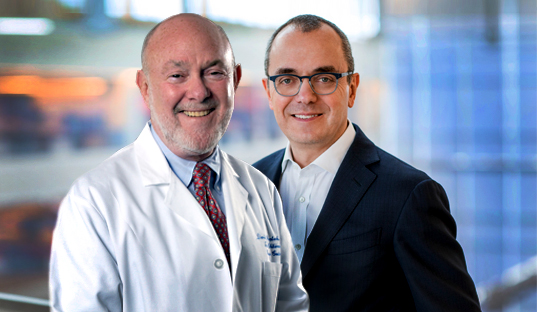Near-certain death sentence
As a result, too few children are effectively diagnosed; and even fewer have access to medicines and other treatments, which are often available in locations too distant for many to reach. These factors are compounded by a mix of cultural factors and low expectations, which often lead some in rural communities to question the utility of conventional medical care.
Taken together, this dire mix of challenging circumstances means that for the children of these regions - unlike in other parts of the world - cancer is a near-certain death sentence.
This must change, and we and our partners are determined to do our part to change the pediatric cancer landscape in sub-Saharan Africa. Specifically, we are determined to develop model programs, help build the needed capacity and train healthcare providers, and to provide a blueprint for other countries to follow.
To that end, this week at an event with His Excellency the President of Botswana, Lieutenant General Seretse Khama Ian Khama, we launched a new initiative to directly and effectively address the significant unmet need of childhood cancer in eastern and southern Africa. Called Global HOPE (Hematology-Oncology Pediatric Excellence), the plan is to build and operate an innovative pediatric hematology-oncology treatment network that will help provide long-term capacity to treat and dramatically improve the prognosis of thousands of children in the region. And to make this happen, our two organizations have committed a combined $100 million.
Greater Global Focus
This commitment will help support the training network and the construction, equipping and operation of two regional pediatric hematology-oncology clinical sites in Botswana and Uganda, and an additional national program in Malawi. Within the first five years, we expect to train thousands of healthcare professionals from these three countries, and from other countries in the region, who will represent a variety of disciplines along the cancer care continuum. They, in turn, will be able to train others.
The significant expansion of treatment of children will begin immediately, even before either of the sites is constructed, by using temporary facilities. This builds on ongoing efforts by Texas Children’s Cancer and Hematology Centers to treat patients and train healthcare professionals in the region. In fact, in three of the countries that are the immediate focus of this effort – Botswana, Malawi and Uganda – there were no pediatric oncologists until Texas Children’s Hospital became involved.
This type of partnership, with this type of focus, is at the center of the “Access Accelerated” initiative launched in January at the World Economic Forum in Davos. It reflects the growing recognition of the need for a greater global focus on non-communicable diseases, most notably cancer, in low- and middle-income countries. And it reflects the growing appreciation that public-private partnerships are critically important to any meaningful approach and that no one company or organization or government can do it alone.
To help ensure Global HOPE’s success, we are building on our 18 years of experience gained through our work to address the HIV/AIDS crisis in sub-Saharan Africa. Through a public-private partnership between the Bristol Myers Squibb Foundation’s SECURE THE FUTURE program, the Baylor International Pediatric AIDS Initiative (BIPAI) at Texas Children’s Hospital and the governments of five African nations, we have been able to train 52,000 healthcare professionals and have provided care and support for more than 300,000 children and their families.
Although we recognize the challenges of such an undertaking and that a complete cure for pediatric cancer is beyond our reach at the moment, we also recognize that the children of southern and eastern Africa – like children everywhere – deserve a chance to be healthy and to enjoy their childhoods. They deserve a chance to grow into adults and raise families of their own. They deserve a chance at life.
And we are determined to do our part to make that happen.
Giovanni Caforio, M.D., is the CEO of Bristol Myers Squibb and Chairman of the Bristol Myers Squibb Foundation. David G. Poplack, M.D, is Director of Texas Children’s Cancer and Hematology Centers and Elise C. Young Professor of Pediatric Oncology at Baylor College of Medicine.
1 Economist March 2014




